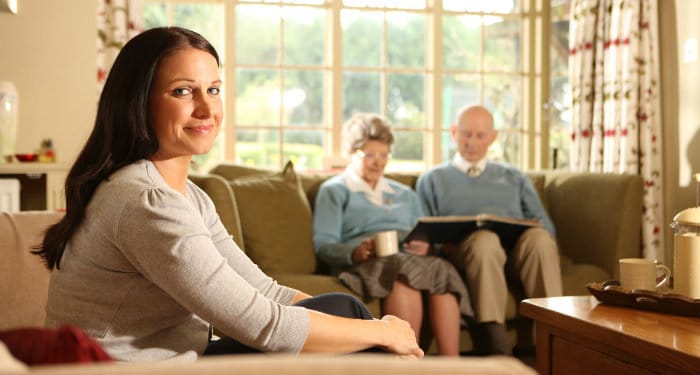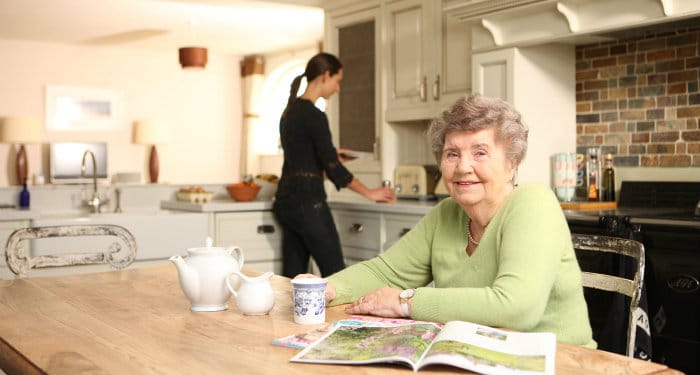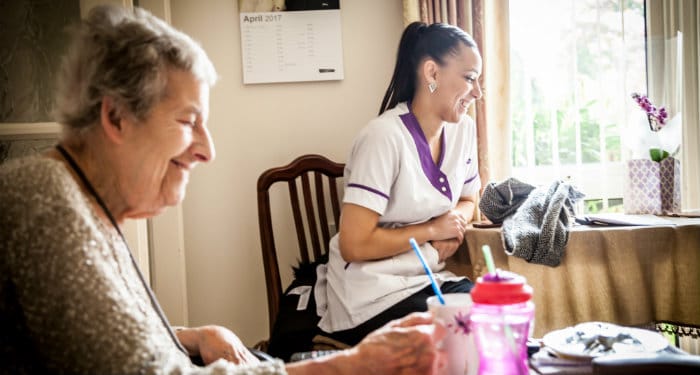There’s no one-size fits all formula when it comes to dementia. Each family’s case is unique, requiring various levels of care and assistance. You may already have the challenge of balancing a number of roles such as partner, parent, adult child, and employee, but if the time comes when you need extra support, there are several options you can look in to.
When considering options for future care, residential nursing homes come straight to mind, but that’s not the only option available. Familiarity and routine are key for your loved ones, that’s why more families than ever are turning to home care, from respite to live-in. So, what options are available, what do they entail, and what are their benefits?
Nurse-led home visits
Care and support in the comfort of your loved one’s home far outweigh those of residential homes. Whether you’re looking for an extra hand at breakfast, help with personal care, housekeeping or shopping trips, visiting care allows you and your family to continue living the lives you lead, with very little disturbance.
Visiting home care can be daily, once a fortnight, or every now and again, meaning carers can visit as frequently as you like, with individualised care plans. Your loved one can build a great relationship with their regular carer, turning help into friendship and turning your doubt into trust.

Respite care to give you a break
Everyone needs a break, and that’s exactly what respite care offers. Respite care is an arrangement designed to provide rest or relief to unpaid carers, temporarily. Not only does this type of care enable families and carers to have a break, go out, attend to appointments or simply recharge, it also gives the person suffering with dementia an opportunity to socialise, meet others in similar situations, and gain a level of independence again – so don’t feel guilty, it’s beneficial for the both of you.
Residential care homes often advertise respite care, but dropping your loved one off at an accommodation they’ve never experienced before, could make the experience overwhelming for you all. If you have a spare room, or space for a live-in carer, there is the option for a carer to temporarily move in to your home and support your loved one.
One-to-one palliative support
While many people receive palliative care within a hospice, hospital or residential nursing home, palliative care in your own home is becoming a popular choice for many families. Familiar faces, ornaments and home layouts are key to comforting you and your loved one during a time of distress.
Palliative home care can involve anything from personal care, (bathing, dressing & toileting) to housekeeping duties (vacuuming, dusting, changing beds and doing the laundry), and can be as often or as little as you require.
The final stages are a daunting and upsetting time for you, your family, and your dearest, but having an experienced, supportive carer on hand will allow you to spend your last moments together as a family.

Continuous, 24-hour live-in support
Acknowledging the fact you need a helping hand can be unnerving, it’s understandable. It’s always been you, your loved one and your family in the house you call home. Accepting an external carer into your home can be difficult, but would your loved one want you to be mentally drained and constantly worrying about their needs? They’d want you to be happy and to ease the already difficult experience you’re going through.
Moving to a new home is a stress for anyone, never mind someone with dementia. That’s why live-in care is such a popular option, retaining daily routines, familiar environments and friendly faces.
The type of care provided in your home is entirely up to you, whether that’s cooking your favourite meals, keeping the bathroom clean or personal care such as bathing and going to the toilet.
Dementia care available in Manchester
Dementia is a complex condition which entails specialist training. Typically, each patient is at a different stage of the condition, consequently requiring different levels of support from their carers. Nevertheless, research has found that all dementia patients have responded better to care in their own home rather than a residential care home or hospice.
Helping Hands have provided care for people suffering with dementia for over 30 years. In that time, our carers have developed an intrinsic understanding of the condition, not only to the sufferers, but the families dealing and coping with the diagnosis.
Choosing the right type of care often prevent unnecessary hospitalisation, that’s why we’ve made the process as smooth as possible. Simply visit your local branch, and Leanne (Branch Manager) will be more than happy to discuss the appropriate care package to suit your loved one’s needs.

You’re not alone…
Not only does feedback help us, it helps you too. Click here to read how our carers and support workers have helped others in similar situations.
